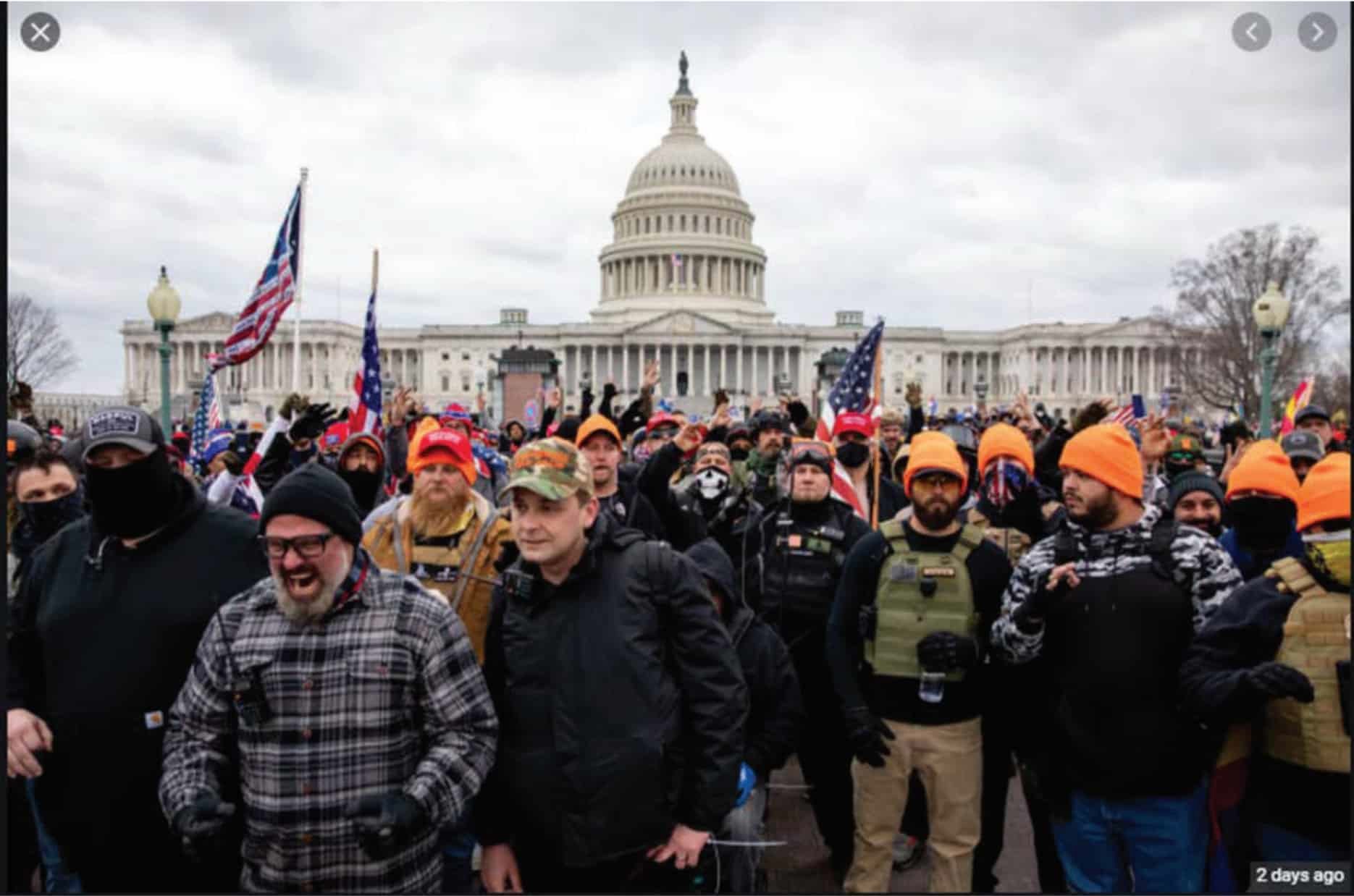WASHINGTON (CN) — Before leaders of the neo-fascist Proud Boys hear their sentences for their role in planning the Jan. 6, 2021, Capitol riot, Enrique Tarrio and his lieutenants heard testimony Tuesday from Capitol Police officers about the “heart-clutching” fear they felt that day.
At the start of the hearing, U.S. District Judge Timothy Kelly heard statements from three U.S. Capitol Police officers — officer Shae Cooney, inspector Tom Loyd and former officer Marc Ode — who submitted a written statement rather than appearing.
Cooney said she was a part of the police line at the Lower West Terrace, which has been described as the site of the worst violence throughout Capitol riot cases, where officers defended a tunnel entry for hours as rioters beat them with stolen police batons and makeshift weapons like flag poles.
“That day was the first time I wasn’t sure if I was going home that night,” Cooney said, holding back tears. “Feeling my phone vibrate for hours knowing that my family was trying to reach me, and I couldn’t do anything was heartbreaking.”
She described how shocking it was to hear and see countless pro-police phrases and imagery from the protestors as they clashed with officer and beat them with “Thin Blue Line” flags, and how the violence led to the deaths of officers like Brian Sicknick and multiple officers’ suicides after the riot.
“I lost a friend that day, someone I had worked with for almost three years. I was standing right next to him when we started fighting and by the end of the night he was gone,” Cooney said.
The government’s sentencing memorandum against Tarrio and his five co-defendants credits the group with breaking multiple police lines and participating “in every consequential breach at the Capitol,” by tearing down fencing to push further toward the building and breaking windows to allow the first rioters to enter.
Justice Department prosecutors have requested that Tarrio, who was convicted on the rare Civil War-era seditious conspiracy charge along with three other defendants after a monthslong trial, be sentenced to 33 years in prison. Tarrio was not present at the riot itself, having been arrested two days prior on Jan. 4, 2021, for burning a Black Lives Matter flag at a separate protest.
Joseph Biggs, a self-described Proud Boys organizer who was also convicted of the conspiracy charge, faces a 33-year prison term per the government’s recommendation.
If Judge Kelly agrees, that would be the longest sentence of any defendant linked to the Capitol riot — nearly double the 18 years ordered for Oath Keeper founder Stewart Rhodes in May.
Prosecutors have requested the Donald Trump appointee impose similarly lengthy sentences for other members of the group: 30 years for Zachary Rehl, president of the group’s Philadelphia chapter; 27 years for Ethan Nordean, a chapter president in Washington state; and 20 years for Dominic Pezzola, a member from New York who was the only defendant acquitted of seditious conspiracy.
Former Capitol Police officer Marc Ode, who was attacked and had his riot shield stolen by Pezzola, described in a written statement read aloud by prosecutor Jason McCullough how he was pulled to the ground, dogpiled on and pepper sprayed by rioters.
He wrote that he felt like he was dying and began envisioning his own funeral. While he survived, he continues to deal with a shoulder injury, a wound he said serves “as a reminder of what was and what could have been.”
During Tuesday’s hearing, Kelly weighed several possible enhancements that could add years to the defendants’ sentences, including a so-called “terrorism enhancement” that prosecutors also successfully sought in their case against Rhodes. Kelly said he would determine whether to apply that enhancement for each defendant separately at their sentencing hearings later in the week.
Kelly rejected motions for acquittal and a new trial made by each of the defendants who claimed there was not enough evidence to sustain their convictions, providing in excruciating detail all of the evidence that supported the jury's verdicts.
The seditious conspiracy statute, created after the Civil War as lesser crime than treason that the government could use to prosecute the remnants of the Confederacy who continued to fight following the Union’s victory.
The statute requires prosecutors to prove a defendant had “conspire[d] to overthrow, put down, or to destroy by force the Government of the United States.”
Before Rhodes and Kelly Meggs, the leader of the Florida Oath Keeper chapter who received 12 years, were sentenced in part on their seditious conspiracy charge, the last person to receive a prison sentence on the charge were the 1993 World Trade Center attackers.
Unlike several of the Oath Keepers, each of the five Proud Boy defendants will have separate sentencing hearings scheduled throughout the week. Tarrio and Nordean will be sentenced on Wednesday, Biggs and Rehl on Thursday and Pezzola on Friday.
In the 31 months since the Capitol Riot, the Justice Department has charged over 1,100 people in connection with their actions on Jan. 6, and approximately 597 people have been sentenced. The investigation is still ongoing, with approximately 321 people who assaulted officers still unidentified.
Subscribe to Closing Arguments
Sign up for new weekly newsletter Closing Arguments to get the latest about ongoing trials, major litigation and hot cases and rulings in courthouses around the U.S. and the world.









